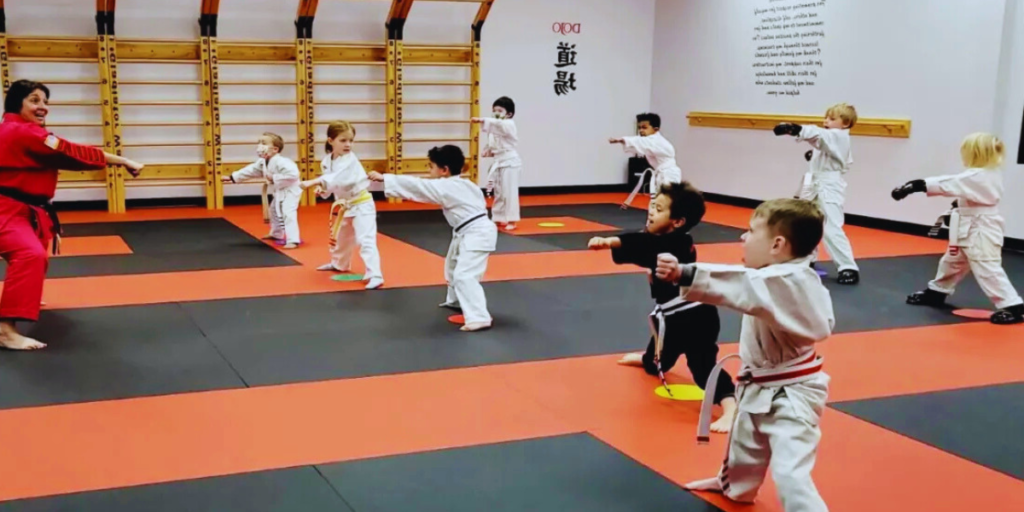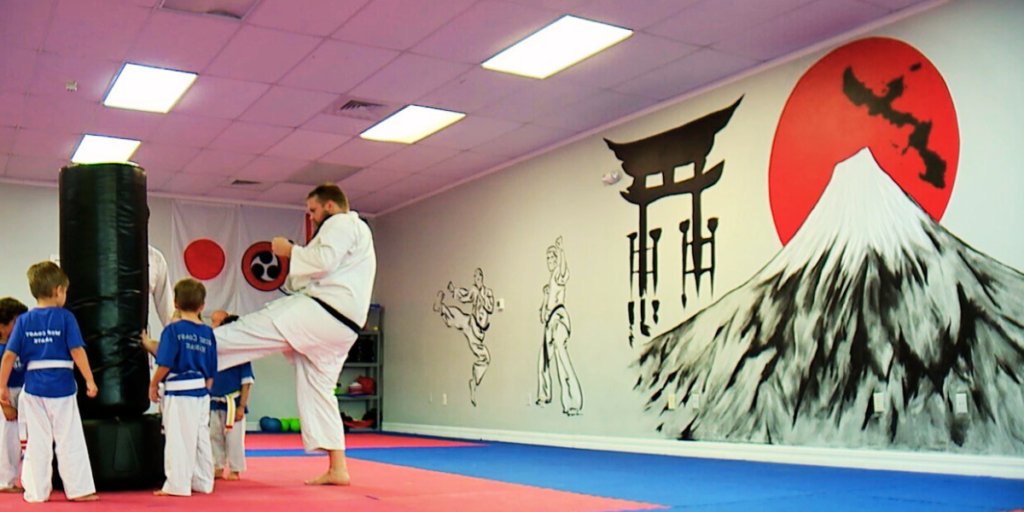When you think about karate, one of the first things that comes to mind is likely the Dojo. But what is a dojo in karate? And why is it important to know about it?
It’s much more than just a physical space. A dojo is the heart of karate training, where students come to hone their skills, learn techniques, and embrace the spirit of martial arts.
In Japanese tradition, The Dojo is a sacred place and thats why karateka’s have to baw toward the Dojo before entering it.
For karate practitioners, the Dojo becomes a home away from home, a space to connect with others who share the same passion, and a place to grow in their martial arts journey and as individuals.
Understanding the significance of the Dojo is essential for anyone who wants to dive deeper into karate.
In this blog, we’ll dive into the meaning of the Dojo, its role in karate, and why it’s so crucial for karate practitioners of all levels.
What Does Dojo Mean?

The Definition of Dojo
The word “dojo” (道場) comes from Japanese, where “do” means “way” or “path” and “jo” means “place.”
So, a dojo is a “place of the way” where one follows a path of learning and growth.
In the context of karate, it refers to the training hall or space where martial artists gather to practice their skills.
But it’s not just any place—it’s a space where the principles of karate come to life.
Dojo vs. Other Training Spaces
When you think of a place to work out, gyms and fitness centers come to mind.
They’re filled with equipment like weights, treadmills, and machines designed for physical exercise.
While gyms are great for building strength and fitness, they don’t offer the same experience or mindset as a dojo.
A dojo is not just a space for physical activity; it’s a place that blends tradition, culture, and spirituality with training.
Unlike gyms, which focus mainly on body conditioning and personal fitness goals, a dojo is a sacred space where martial arts are practiced to improve mind and body.
The atmosphere in a dojo is infused with respect, discipline, and the pursuit of personal growth.
The spirituality of a dojo is something you won’t find in a gym. It’s a place where students are expected to leave personal distractions behind and fully immerse themselves in the practice.
The Role of the Dojo in Karate
Dojo Kun: The Heart of Karate’s Ethical Practice
Every sport has its own training ground. Boxers put effort into gyms, and mixed martial artists do the same.
However, for karate, the Dojo is not just a training ground to lose blood and sweat.
Why is Dojo different from other training areas? Because no training ground has codified rules of do’s and don’s or Dojo Kun (道場訓).
What is Dojo Kun and Why Does It Matter?
Dojo Kun (道場訓) translates from Japanese as “training hall rules.”
At its core, Dojo Kun (道場訓) is a set of ethical guidelines designed to help practitioners grow inside and outside the Dojo.
While Dojo Kun is closely associated with Shotokan Karate, it’s a universal concept that applies to many styles of karate.
Gichin Funakoshi, the founder of modern karate, formalised the guiding principles. However, they draw from older Okinawan martial arts traditions.
The goal of Dojo Kun is simple yet profound: it teaches us that true mastery in karate goes beyond technique.
The Five Principles of Shotokan Dojo Kun

The Shotokan Dojo Kun comprises five key principles, each beginning with the word Hitotsu (meaning “One”), highlighting the importance of each principle.
They guide us in our karate practice and beyond:
- Seek perfection of character( Hitotsu, jinkaku kansei ni tsutomeru koto): Karate is about more than just refining techniques—it’s about refining who we are as individuals. In Dojo, you must seek perfection in your techniques, characters and yourself.
- Be faithful( Hitotsu, makoto no michi wo mamoru koto): Loyalty is at the heart of karate. You must show loyalty to our sensei, our Dojo, and the tradition of karate itself.
- Endeavour (Hitotsu, doryoku no seishin wo yashinau koto): Perseverance is key. Karate is a lifelong journey; you must remain dedicated and strive relentlessly to improve.
- Respect others (Hitotsu, reigi wo omonzuru koto): Respect is foundational in karate. You show respect not only to our instructors and fellow students but also to yourself. Every bow, every gesture, and every word is infused with this sense of respect.
- Refrain from violent behaviour(Hitotsu, kekki no yū wo imashimuru koto): Karate is about self-control, not aggression. This principle teaches us to use our skills responsibly, to avoid conflict, and to practice humility. Karate isn’t about fighting—it’s about mastering ourselves.
Why Dojo Kun is Essential
The Dojo Kun is one of the fundamentals of what makes karate more than just a physical activity—it’s what makes it a holistic practice that nurtures the mind, body, and spirit.
It teaches us that the true goal of karate is not to conquer others but to master ourselves. We can improve as martial artists and individuals through effort, respect, and self-control.
Dojo Etiquette: Respecting the Space and Others
In a dojo, etiquette is vital in creating an environment of respect and discipline.
Dojo etiquettes are not a black-and-white rules but rather ritual that has been practised for thousands of years.
Here, I will discuss the most basic of such etiquettes that you need to know before you lay your foot on a mat.
Firstly, One of the most critical aspects of dojo etiquette is bowing.
Bowing symbolizes respect for the Dojo itself and the people within it.
Before you enter or leave the Dojo, you bow to acknowledge the space and show respect for the teachings and the martial arts.
When you bow to your sensei, you acknowledge their authority and express gratitude for their guidance and knowledge.
Secondly, You need to maintain Silence in a Dojo. In Japanese culture, Dojo is treated as a sacred place, like a monastery, where you can listen to your master and seek perfection.
The Dojo is a place for deep concentration, and Silence helps create the mental space needed for effective learning.
It’s a way of showing respect for the practice and your fellow students striving to improve.
Finally, following your instructor’s commands without hesitation is crucial to dojo etiquette.
Karate is all about precision, and when your sensei gives a command, it’s expected that you follow it with discipline and attention to detail.
In short, etiquette in the Dojo isn’t about rigid rules—it’s about showing respect for the art, the space, and the people around you. It helps make the Dojo a place of personal growth and mutual respect.
What to Expect in a Karate Dojo

After learning about all these rules and etiquette, When you first step into a karate dojo, You might feel a bit intimidated.
But don’t worry—everyone starts somewhere, and the Dojo is a supportive environment where you can grow at your own pace.
The atmosphere in a dojo is typically respectful and focused. You’ll notice a sense of calm and discipline setting the session’s tone.
Students bow when they enter the Dojo and before they begin training, showing respect for the space, their instructor, and their fellow practitioners.
This creates a peaceful yet intense environment where everyone focuses on personal growth.
Classes usually begin with a warm-up. These are designed to get your body moving and ready for the physical demands of karate.
After the warm-up, the instructor will guide you through the basic techniques, such as stances, punches, and kicks.
In the beginning, you’ll focus a lot on the fundamentals. As you progress, you’ll learn kata (forms), which are sequences of movements that help you practice techniques in a structured way.
Sparring might be introduced later, but don’t worry—it’s all part of the learning process and done in a controlled, safe environment.
Here’s a sample class schedule to give you an idea of what to expect:
Time | Activity |
5-10 minutes | Warm-up exercises |
10-20 minutes | Basic techniques (punches, kicks, stances) |
20-30 minutes | Kata (form practice) |
30-40 minutes | Light sparring (for more advanced students) |
40-45 minutes | Cool down and stretching |
FAQ Section
What Should I Wear to a Karate Dojo?
When you enter a karate dojo, you’ll need to wear a Karate Gi—the traditional uniform worn by karate practitioners.
The gi is more than just clothing; it represents respect for the Dojo and its traditions.
The gi is typically made of durable fabric and consists of a jacket, pants, and a belt that shows your rank.
Beginners start with a white belt and progress as they master more techniques.
Do I Need to Be Fit to Join a Dojo?
One of the great things about karate is that it’s suitable for people of all fitness levels.
Whether you’re in great shape or starting to get active, you can begin karate training.
The dojo environment is welcoming and supportive, and instructors will guide you at a comfortable pace. In fact, many beginners find that karate helps improve their fitness over time.
How Do I Choose the Right Dojo for Karate?
Choosing the right Dojo is an essential step in your karate journey, and there are a few things to remember.
First, location is key—look for a dojo that’s easy for you to get to, as consistency is essential for progress.
Next, consider the style of karate offered. Some dojos focus on traditional karate styles like Gojo Ryu. In contrast, others may emphasize sport karate or self-defence techniques Such as Shotokan, Kykoshin, Etc.
It’s essential to find a dojo that aligns with your personal goals. When visiting dojos, pay attention to the atmosphere.
Is it welcoming? Are the instructors knowledgeable and respectful?
Finally, talk to other students and ask about their experiences. You want to ensure you feel comfortable and motivated in the Dojo you choose, as it will play a significant role in your success.
Final Thought
In short, Karate Dojo is not just a training place, rather a secred monestry where you come to build character.
It is a space where discipline, respect, and community come together to shape a martial artist’s physical and mental growth.
Now that you know what a dojo in karate truly means, I encourage you to find one that resonates with you.

